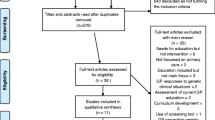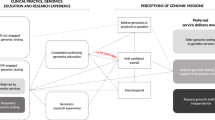Abstract
The National Health Service (NHS) National Genetics Education and Development Centre was established by the Department of Health in 2004 to help drive and co-ordinate genetics education for health professionals working outside specialist genetic services. This paper reviews the experiences and lessons learned to date. At the outset, it was clear that understanding the learning ethos, preferred delivery methods and attitudes towards genetics of different NHS healthcare groups was vital. We collected evidence by undertaking needs assessments with educators, practitioners and patients. We have determined the genetics knowledge, skills and attitudes which they said were needed and translated these into learning outcomes and workforce competences in a continuum of education. Beginning with core concepts introduced (and examined) pre-registration, the continuum continues with development of concepts post-registration as appropriate for role, leading to practical application and assessment of competences in the workplace. These are supported by a portfolio of resources which draw heavily on patient based scenarios to demonstrate to staff that genetics is relevant to their work, and to convince educators and policy makers that genetic education is likely to result in real clinical benefit. A long term educational policy, inclusive of learners, educationalists and their institutions must be evidence based, flexible and responsive to changes in workforce structure, provision of clinical services and conceptual and financial commitments to education. The engagement of national policy, regulatory and professional bodies is vital (www.geneticseducation.nhs.uk).


Similar content being viewed by others
References
Barr, J., Freeth, D., Hammick, M., Koppel, I., & Reeves, S. (2000). Evaluations of interprofessional education: A United Kingdom review of health and social care. London: CAIPE/BERA.
Bennett, C., Burton, H., & Farndon, P. (2007). Competences, education and support for new roles in cancer genetics services: Outcomes from the cancer genetics pilot projects. Familial Cancer, 6, 171–180.
Burke, S., Bedward, J., Thomas, H., & Farndon, P. (2005b). Genetic education for non-genetics SpRs: A needs analysis. University of Birmingham. http://www.geneticseducation.nhs.uk/teaching/GENE%20report%20Genetics%20Education%20for%20non%20genetics%20SpRs.pdf accessed July 2007
Burke, S., Bennett, C., Bedward, J., & Farndon, P. (2007). The experiences and preferences of people receiving genetic information from healthcare professionals. Birmingham: NHS National Genetics Education and Development Centre.
Burke, S., Stone, A., Bedward, J., Thomas, H., & Farndon, P. (2006). A “neglected part of the curriculum” or “of limited use”? Views on genetics training by non-genetics medical trainees and implications for delivery. Genetics in Medicine, 8, 109–115.
Burke, S., Stone, A., Martyn, M., Thomas, H., & Farndon, P. (2005a). Genetic education for GP Registrars. University of Birmingham. Available at http://www.geneticseducation.nhs.uk/teaching/GP%20GENE%20final%20report.pdf
Burton, H. (2002). Education in genetics for health professionals. Report to the Wellcome Trust. Public Health Genetics Unit. http://www.phgfoundation.org/pages/eduprojects.htm#addressing Accessed 18 July 2007
Farndon, P., & Newton, R. (2006). Genetics here and now: A place in dietetic practice? Dietetics Today, 41(8), 32–34.
Federation of the Royal Colleges of Physicians (2007). The physician of tomorrow: Curriculum for core medical training and acute care common stem (Medicine). Accessible through: www.jrcptb.org.uk
Kipling, R. (1902). The elephant’s child in Just So Stories. Available at http://www.kipling.org.uk/poems_serving.htm (accessed July 2007)
Kirk, M. (1999). Preparing for the future: The status of genetics education in diploma-level training courses for nurses in the United Kingdom. Nurse Education Today, 19, 107–115.
Kirk, M., & Tonkin, E. (2006). Genetics Education for Nursing Professional Groups: Survey of practice and needs of UK educatiors in delivering a genetics competence framework. University of Glamorgan, Pontypridd. Available at www.geneticseducation.nhs.uk/downloads/NursingEducatorsSurvey_Report.pdf
Kirk, M., Tonkin, E. & Burke, S. (2008) Engaging nurses in genetics: The strategic approach of the NHS National Genetics Education and Development Centre. Journal of Genetic Counselling, 17(2)
Korf, B. R. (2002). Integration of genetics into clinical teaching in medical school education. Genetics in Medicine, 4(6 Supplement), 33S–38S.
Metcalfe, A., & Burton, H. (2003). Post-registration genetics education provision for nurses, midwives and health visitors in the UK. Journal of Advanced Nursing, 44, 350–359.
Metcalfe, A. Haydon, J., Bennett, C., & Farndon, P. (2007). Midwives’ views of the importance of genetics and their confidence with genetic activities in clinical practice: Implications for the delivery of genetics education. J Clin Nurs. Jun 30; [Epub ahead of print] PMID: 17608634
Newton, R., Burke, S., Bennett, C., Whelan, K., Burton, H., & Farndon, P. (2007). Dietitians’ views of the importance of genetics to dietetic practice: The impact of education. Journal of Human Nutrition and Dietetics, 20, 362–387.
NHS National Genetics Education and Development Centre and Skills for Health. (2007). UK national workforce competences for genetics in clinical practice for non-genetics healthcare staff. http://www.geneticseducation.nhs.uk/develop/index.asp?id = 44. Accessed 18 July 2007.
Royal College of General Practitioners. (2007). Genetics in Primary Care: Curriculum statement 6. Accessible at http://www.rcgp-curriculum.org.uk/PDF/curr_6_Genetics_in_Primary_Care.pdf
Schön, D. A. (1991). The Reflective practitioner. Aldershot: Ashgate Publishing Ltd.
Acknowledgements
The NHS National Genetics Education and Development Centre is funded by the English Department of Health and the Welsh Assembly Government.
Author information
Authors and Affiliations
Corresponding author
Rights and permissions
About this article
Cite this article
Farndon, P.A., Bennett, C. Genetics Education for Health Professionals: Strategies and Outcomes from a National Initiative in the United Kingdom. J Genet Counsel 17, 161–169 (2008). https://doi.org/10.1007/s10897-007-9144-x
Received:
Accepted:
Published:
Issue Date:
DOI: https://doi.org/10.1007/s10897-007-9144-x




